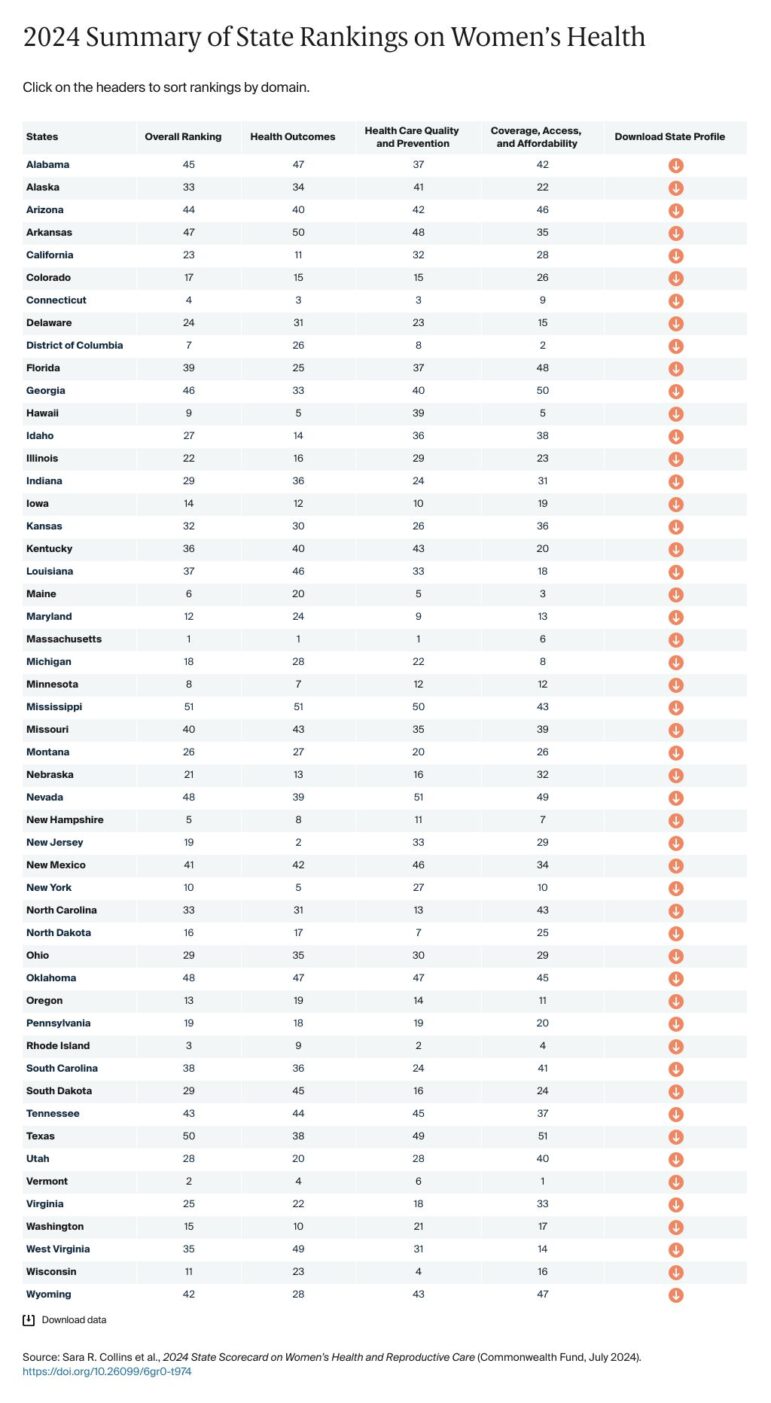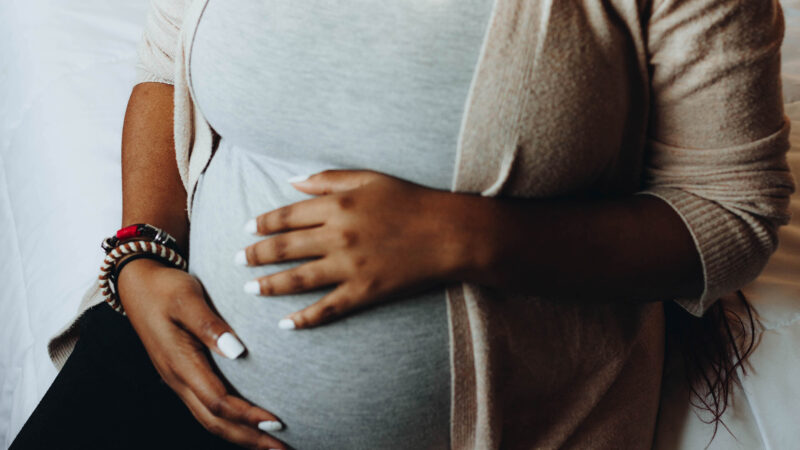Women’s health care in the Gulf South is ‘bleak,’ new report says. Here’s how Alabama ranks
The state of women’s health care in the South is “bleak,” according to a new report from the Commonwealth Fund, a research foundation focused on improving health care in the U.S.
The report assigns a “scorecard” for each state, ranking how well the health system is working for women. Louisiana is ranked 37th overall. Alabama is ranked 45th. Mississippi is ranked 51st — dead last.
Deaths from preventable causes are increasing, and significant racial disparities persist, particularly in maternal mortality and deaths from breast and cervical cancers. Although there was a slight improvement in women’s life expectancy in 2022, it remains at its lowest since 2006.
These alarming health trends are occurring amidst state policy choices and judicial decisions that restrict access to comprehensive health services and reproductive care.
Ten states have not expanded Medicaid eligibility, leaving nearly 800,000 women uninsured. Varied approaches among states to phasing out COVID-19 pandemic-era Medicaid coverage have left millions of women either newly uninsured or facing significant gaps in coverage.
These coverage losses are not only hindering women’s access to care but also putting providers serving low-income women at risk of closure. A recent survey found that 95% of community health centers, which care for 40% of low-income women — nearly half of whom are covered by Medicaid — reported having patients who were disenrolled.
The 2022 U.S. Supreme Court decision overturning Roe v. Wade has further fractured women’s health care access, especially in treating pregnancy complications.
Since the decision, 21 states have imposed new limits or bans on abortion. Florida’s six-week ban, effective April 2024, severely restricts abortion access across the South, where all states now have similar restrictions.
Dr. Joseph Betancourt, president of the Commonwealth Fund, said this report — the first focused on women the organization has done — examined the impacts of these policies.
“We were interested in recent policy choices and judicial decisions restricting access to reproductive care, in particular, that have and may continue to exacerbate, women’s health,” Betancourt said.
Even before the Dobbs decision, these states had few maternity care providers, higher maternal mortality rates — particularly among women of color — and significant racial and ethnic disparities in their health systems. In 2022, more than a third of U.S. counties had limited or no access to maternity care.
The disparities are especially pronounced in the Mississippi Delta. Betancourt said the report identified clear distinctions between states with health systems that perform well for women and those that don’t.
Characteristics of higher-performing systems include investments in health insurance coverage for residents — Medicaid expansion — and making all women’s healthcare, including abortion, legal and accessible.
“When we look at the Gulf states, we see certain characteristics playing out in a negative way,” Betancourt said.
Here’s a quick, state-by-state breakdown of the report’s findings for our region:
Alabama
Data shows that Alabama ranks 47th for health and reproductive care outcomes for women. It also ranks low on insurance coverage, provider access and health care affordability.
The state performed best in women with up-to-date colon and cervical cancer screenings.
Alabama performed the worst in preterm birth rate and infant mortality. The state also ranked poorly for maternity care staff available to women.
Louisiana
Louisiana’s health system for women ranked highest among the Gulf South at 37th, but the state ranked 46th on health and reproductive outcomes — just ahead of Alabama.
Louisiana is ranked 18th for coverage, access and affordability. It is the only Gulf South state that has expanded Medicaid, which might account for the state’s higher ranking than others in the region.
“We see big differences in states that have expanded Medicaid and those who haven’t,” Betancourt said.
Louisiana performed best in women’s breast and cervical cancer screenings, and performed worst in women’s mortality, women’s mental health and preterm birth rates.
Mississippi
Mississippi’s health system did not perform well by any metric. The state is ranked dead last at 51st overall, with the worst rankings on health and reproductive care outcomes, as well as health care quality and prevention.
The state has the highest rates of uninsured pregnant women and maternal deaths. Syphilis infections are also on the rise.
Mississippi performed best in women getting HIV or AIDS tests — though it still ranked low compared to other states in this statistic — and worst in women getting pneumonia vaccines, infant mortality and preterm birth rates.
Health policy can influence health outcomes
Women’s health is in a “fragile state,” Betancourt said, and these gaps could widen further because of recent legislation and court rulings around reproductive care access.
That also means policy can improve women’s health.
The report found investing in and fortifying primary care and maternal health workforce, investing in more prenatal and postpartum checkups and investing in postpartum depression screening could all help boost health outcomes for women.
“Our recommendations fall in line with the evidence. They’re really based on what we see,” Betancourt said. “We see higher-performing states doing better by way of making reproductive health — the entire continuum of women’s health — legal and accessible.”
For more, read the full report here.

This story was produced by the Gulf States Newsroom, a collaboration between Mississippi Public Broadcasting, WBHM in Alabama, WWNO and WRKF in Louisiana and NPR. Support for health equity coverage comes from The Commonwealth Fund.
Bill making the Public Service Commission an appointed board is dead for the session
Usually when discussing legislative action, the focus is on what's moving forward. But plenty of bills in a legislature stall or even die. Leaders in the Alabama legislature say a bill involving the Public Service Commission is dead for the session. We get details on that from Todd Stacy, host of Capitol Journal on Alabama Public Television.
My doctor keeps focusing on my weight. What other health metrics matter more?
Our Real Talk with a Doc columnist explains how to push back if your doctor's obsessed with weight loss. And what other health metrics matter more instead.
Baz Luhrmann will make you fall in love with Elvis Presley
The new movie is made up of footage originally shot in the early 1970s, which Luhrmann found in storage in a Kansas salt mine.
Forget the State of the Union. What’s the state of your quiz score?
What's the state of your union, quiz-wise? Find out!
A team of midlife cheerleaders in Ukraine refuses to let war defeat them
Ukrainian women in their 50s and 60s say they've embraced cheerleading as a way to cope with the extreme stress and anxiety of four years of Russia's full-scale invasion.
As the U.S. celebrates its 250th birthday, many Latinos question whether they belong
Many U.S.-born Latinos feel afraid and anxious amid the political rhetoric. Still, others wouldn't miss celebrating their country








